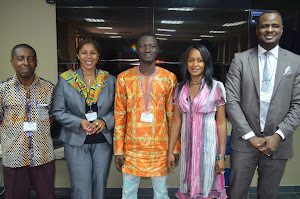BY EDMUND SMITH-ASANTE
The Coalition of
NGOs in Water and Sanitation (CONIWAS), has blamed Ghana’s poor performance in
sanitation especially, but also hygiene and water coverage, on the inadequacy
of funding to the sector over the years.
Stressing that
the availability of timely and adequate financial resources provides lifeblood
for the success and survival of not only businesses, but many other life endeavours,
the coalition said “The Water, Sanitation and Hygiene (WASH) Sector in Ghana suffers
from chronic under funding, resulting in the poor sanitation situation in the
country.”
According to
CONIWAS, it is this state of affairs in the country that informed the choice of
theme: “Financing The Wash Sector: Past,
Current Trends And Vision For The Future” for this year’s national WASH forum
(Mole XXIII), set to take off at Ghana’s Northern Regional capital, Tamale
Wednesday, August 22, 2012.
Further underscoring
the crucial need for adequate financing to the WASH sector, and the relevance
of this year’s Mole Conference theme, the coalition in its background paper for
the conference quoted a statement made by Ghana’s former President and chair for
the 2nd High Level Meeting (HLM) held in Washington DC, John Agyekum
Kufuor, on April 21, 2012, that “the dream of universal access to sanitation
and water is within our reach, but a tremendous
increase in political will, adequate resources and coordinated efforts
is required to get us there”.
But CONIWAS
says, “Ironically, Government allocations to the WASH sector since 2006 have
consistently fallen below 2% of annual Gross Domestic Product (GDP),” adding, “According
to the sector performance report (GOG/MWRWH, 2010) it has shown a downward
trend, having dropped from 1.52% in 2006 to 0.52% in 2010.”
The coalition
further disclosed that an assessment made of the post 2010 annual budget, showed
that Ghana met this commitment by 46% and 72% in 2011 and 2012 respectively.
“However, while,
CSOs and CONIWAS membership acknowledge progress made in the water sub-sector,
it is difficult to accept that actual release of funds was done to support
sanitation delivery in particular, given the abysmal sanitation situation in
the country, with just 14% coverage of improved sanitation (JMP Report 2012
Update),” they said.
Shoring up its
call for more funding for Ghana’s WASH sector, the coalition cited the
eThekwini declaration for which Ghana is a signatory, which obliges the country’s
government to invest up to 0.5% of GDP in sanitation and decried the country’s
current commitment which hovers around 0.1%.
According to
CONIWAS, another critical consideration for the decision to focus Mole XXIII on
sector financing, is the economic gains and multiplier effects that come with
investment in WASH.
“For instance,
the Rural Sanitation Model and Strategy (R-SMS) of our country documents
extensively what could be returns on investment in sanitation. Among others, it
posits that poor sanitation costs Ghana a whooping US$ 290m per year. This is
about 1.6% of our GDP, far in excess of what we are currently spending on the
sub-sector,” the coalition stated.
The R-SMS
further estimates that open defecation alone costs Ghana US$ 79m annually, and
that US$ 215m is lost each year to premature deaths emanating from diarrheal
diseases, a direct consequence of poor WASH situation, CONIWAS laments.
Other scary
figures attributable to poor WASH, according to the R-SMS, are that US$ 1.5m is
lost due to productivity losses while sick or accessing healthcare and US$ 54m
spent each year on health care.
To bridge this gap, CONIWAS says it is dedicating the Mole XXIII
conference solely to the subject of sector financing, and its impact on the
WASH sector and the conference is expected to provide in-depth information on
the subject and make the necessary linkages with drinking water (urban and
rural), sanitation and hygiene.
The conference will also share practical lessons on the ground regarding
how this impact is reflected at the community level, while it is envisaged that
policy discussions during the conference will go a long way towards the creation
of the enabling framework to guide and support efficient and effective resource
mobilisation and distribution within the WASH Sector and elucidate on possible
interventions for effective utilisation of funds.
CONIWAS is of
the view that adequate funding (with some measure of efficiency and
effectiveness) will largely guarantee universal access to sanitation and water,
and translate into opportunities for increasing the productivity of Ghana’s
people, enhance enrolment and retention of children (especially girls) in
school, enhance women's dignity and ability to participate fully in development
processes, reduce morbidity and mortality, and prevent water and sanitation
related diseases.
Although
historically, the Mole conference has often focused on issues relating to
access to drinking water, sanitation and hygiene, it will for the first time
put greater emphasis on government financing options, and then build linkages
with the other services as well.
To
this end, the Ministry of Finance and Community Water and Sanitation Agency (CWSA)
will play a major role, whilst the Ghana Water Company Limited (GWCL) and the
Environmental Health and Sanitation Directorate (EHSD) of the Ministry of Local
Government and Rural Development will all provide different perspectives to the
subject, say the organisers.
Key
questions expected to be addressed by the conference include; How poor
financing affects sustainable service delivery targets; What international good
practices exist for WASH sector financing; What roles end-users and community
members can play in WASH financing; What role the private sector can play in
promoting sustainable financing; What the priority options and actions for
stakeholders to consider are and Whether local government authorities and community
members hold the key to ensuring sustainable WASH sector financing.














